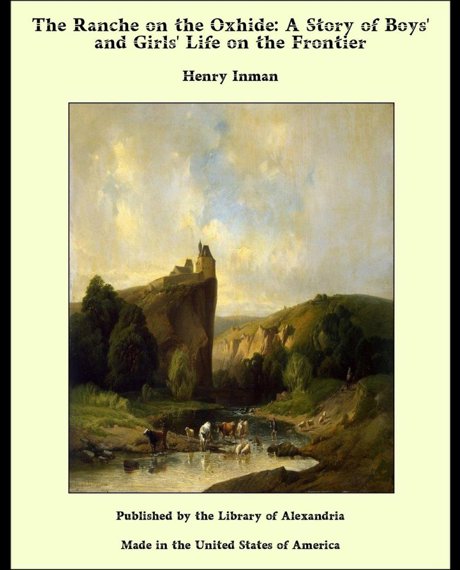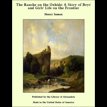The Ranche on the Oxhide: A Story of Boys' and Girls' Life on the Frontier
The Ranche on the Oxhide: A Story of Boys' and Girls' Life on the Frontier
€ 4,99
In 1865-66, immigrants began to rush into the new state of Kansas which had just been admitted into the Union. A large majority of the early settlers were old soldiers who had served faithfully during the war for the preservation of their country. To these veterans the Government, by Act of Congress, made certain concessions, whereby they could take up "claims" of a hundred and sixty acres of the public land under easier regulations than other citizens who had not helped their country in the hour of her extreme danger. Many of them, however, were forced to go out on the extreme frontier, as the eastern portion of the state was already well settled. On the remote border several tribes of Indians, notably the Cheyennes, Kiowas, Comanches, and Arapahoes, still held almost undisputed possession, and they were violently opposed to the white man's encroachment upon their ancestral hunting-grounds, from which he drove away the big game upon which they depended for the subsistence of themselves and their families. Consequently, these savages became very hostile as they witnessed, day after day, the arrival of hundreds of white settlers who squatted on the best land, felled the trees on the margin of the streams to build their log-cabins, and ploughed up the ground to plant crops. Late in the fall of 1866, Robert Thompson, a veteran of one of the Vermont regiments, having read in his village newspaper such glowing accounts of the advantages offered by Kansas to the immigrant, decided to leave his ancestral homestead among the barren hills of the Green Mountain State, and take up a claim in the far West. The family, consisting of father, mother, Joseph, Robert, Gertrude, and Kate, after a journey by railroad and steamboat without incident worth recording, arrived at Leavenworth on the Missouri River, the general rendezvous in those early days for all who intended to cross the great plains, through which a railroad was then an idle dream. In that rough, but busy town, Mr. Thompson purchased two six-mule teams, two white-covered wagons called "prairie schooners," together with sufficient provisions to last a month, by which time he thought he should find a suitable location on the vast plains whither he was going. A few cooking-utensils of the simplest character, together with a double-barrelled shot-gun and a Spencer rifle, constituted the entire outfit necessary for their lonely trip of perhaps three hundred miles, before they could hope to find unoccupied land on which to settle. One Monday morning, bright and early, the teams pulled out of the town, Mr. Thompson driving in the lead, and Joe, who was the elder of the boys, in the other. Gertrude rode with her father and mother, and Kate and Rob with their brother Joe. Their course ran over the broad trail to the Rocky Mountains, on which were then hauled by government caravans, all the supplies for the military posts in the Indian country. Their route for the first two weeks passed through deep forests extending for a long distance from the bank of the great river. The whole family were charmed with the new and strange scenes they passed as they rode slowly on day after day, scenes so different in their details from those to which they had been used in the staid old region they had left so far behind them. The boys and girls, particularly, were in a constant state of excitement. They marvelled at the immense trees as they passed through groups of great elms and giant cottonwoods. The gnarled trunks were vine-covered clear to their topmost branches by the magnificent Virginia creeper, or woodbine, as it is called, the most beautiful of the American ivies, and which grows in its greatest luxuriance west of the Missouri River.
In 1865-66, immigrants began to rush into the new state of Kansas which had just been admitted into the Union. A large majority of the early settlers were old soldiers who had served faithfully during the war for the preservation of their country. To these veterans the Government, by Act of Congress, made certain concessions, whereby they could take up "claims" of a hundred and sixty acres of the public land under easier regulations than other citizens who had not helped their country in the hour of her extreme danger. Many of them, however, were forced to go out on the extreme frontier, as the eastern portion of the state was already well settled. On the remote border several tribes of Indians, notably the Cheyennes, Kiowas, Comanches, and Arapahoes, still held almost undisputed possession, and they were violently opposed to the white man's encroachment upon their ancestral hunting-grounds, from which he drove away the big game upon which they depended for the subsistence of themselves and their families. Consequently, these savages became very hostile as they witnessed, day after day, the arrival of hundreds of white settlers who squatted on the best land, felled the trees on the margin of the streams to build their log-cabins, and ploughed up the ground to plant crops. Late in the fall of 1866, Robert Thompson, a veteran of one of the Vermont regiments, having read in his village newspaper such glowing accounts of the advantages offered by Kansas to the immigrant, decided to leave his ancestral homestead among the barren hills of the Green Mountain State, and take up a claim in the far West. The family, consisting of father, mother, Joseph, Robert, Gertrude, and Kate, after a journey by railroad and steamboat without incident worth recording, arrived at Leavenworth on the Missouri River, the general rendezvous in those early days for all who intended to cross the great plains, through which a railroad was then an idle dream. In that rough, but busy town, Mr. Thompson purchased two six-mule teams, two white-covered wagons called "prairie schooners," together with sufficient provisions to last a month, by which time he thought he should find a suitable location on the vast plains whither he was going. A few cooking-utensils of the simplest character, together with a double-barrelled shot-gun and a Spencer rifle, constituted the entire outfit necessary for their lonely trip of perhaps three hundred miles, before they could hope to find unoccupied land on which to settle. One Monday morning, bright and early, the teams pulled out of the town, Mr. Thompson driving in the lead, and Joe, who was the elder of the boys, in the other. Gertrude rode with her father and mother, and Kate and Rob with their brother Joe. Their course ran over the broad trail to the Rocky Mountains, on which were then hauled by government caravans, all the supplies for the military posts in the Indian country. Their route for the first two weeks passed through deep forests extending for a long distance from the bank of the great river. The whole family were charmed with the new and strange scenes they passed as they rode slowly on day after day, scenes so different in their details from those to which they had been used in the staid old region they had left so far behind them. The boys and girls, particularly, were in a constant state of excitement. They marvelled at the immense trees as they passed through groups of great elms and giant cottonwoods. The gnarled trunks were vine-covered clear to their topmost branches by the magnificent Virginia creeper, or woodbine, as it is called, the most beautiful of the American ivies, and which grows in its greatest luxuriance west of the Missouri River.
| Prijs | Verzendkosten | Totaal | |
|---|---|---|---|
€ 4,99 | € 0,00 | € 4,99 |
Alternatieve producten
© 2016 - 2024 aanbiedingchecker


/backgroundcolor(255,255,255)/jpg(90)/fetch/https://media.s-bol.com/qxRJ0D71Gn4r/XL5rxvV/922x1200.jpg)
/backgroundcolor(255,255,255)/jpg(90)/fetch/https://media.s-bol.com/BzE29BEAALQ/920x1200.jpg)
/backgroundcolor(255,255,255)/jpg(90)/fetch/https://media.s-bol.com/RRY33GAnv0Y/920x1200.jpg)
/backgroundcolor(255,255,255)/jpg(90)/fetch/https://media.s-bol.com/qxjmzpJ2kE1D/838x1200.jpg)